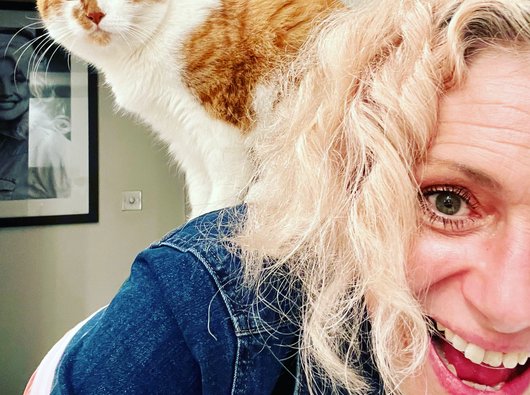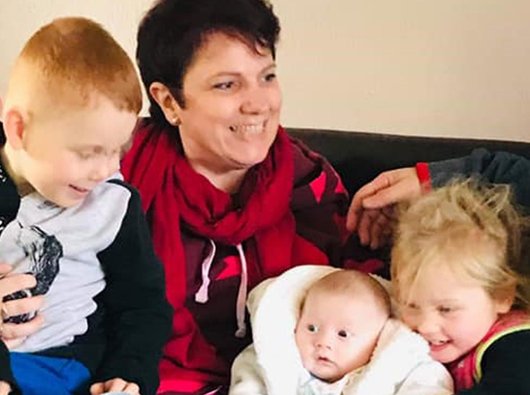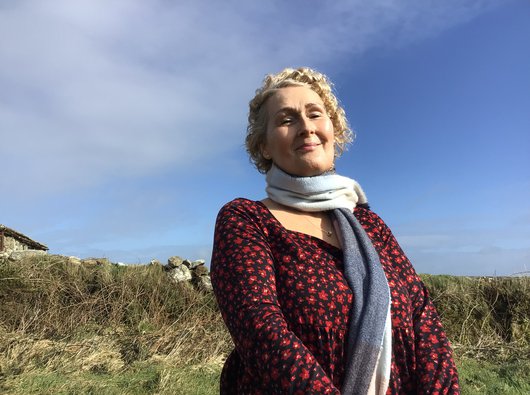Blood cancer: mind and emotions
Read our suggestions for ways to look after yourself and your mental health when you have blood cancer, including where to get more emotional support and how to help your family and friends.
Things you need to know
Living with blood cancer such as leukaemia, lymphoma, myeloma or any other type can be challenging, but there are a few things it may be helpful to keep in mind.
- It’s normal to go through lots of emotional ups and downs. However you feel, it’s OK. You’ll probably have good and bad days, and you won’t be the only one who feels like this.
- There are little things you can do to feel better. Recognising and acknowledging your emotions, being kind to yourself, trying mindfulness exercises and staying active can all help. There is also professional help out there if you need it.
- You don’t have to go through this alone. We’re here for you. Join our online community or contact our Support Services Team to talk to one of our nurses. We also have information to help your family and friends.
Coping with health anxiety
If you have blood cancer, it’s normal to feel anxious about your health and what your diagnosis could mean for you, your loved ones and the future.
If you need treatment, you might be worried about side effects and if the treatment will work as well as you hope. Or, if you’re on active monitoring (watch and wait), you may find it difficult to cope with the uncertainty of whether you’ll need treatment in the future. Lots of people say that waiting for test results can cause anxiety, and others worry about relapse or the cancer coming back later.
You might also find it hard to be honest about your feelings, especially if you’re trying to protect others or if you don’t know who to talk to. However, your mental health is just as important as your physical health, and speaking up might help you feel less alone.
Whatever you’re going through, there is emotional and practical support available. This page contains information about things you can do to help yourself, as well as ideas about where to go for additional support. We also have suggestions for things that could help your family and friends. Different things work for different people, and hopefully you’ll find something here that helps you.
If you’d like to speak to other people in a similar situation, or just read about their experiences and see what helped them, join our online community forum. You can stay anonymous, and you don’t have to create an account if you don’t want to.
"Even though I no longer need treatment, my CML isn’t ‘cured’ – it’s a cancer that’s managed, it’ll never completely go away. I’m living with it, and this is a challenge for my mental health. There’s always that uncertainty."
Read Maggie's story about why it's important to look after your mental health.

Ways to help yourself
If you’re not feeling great, it can be overwhelming to find and try new ways to cope on top of everything else. This section has a list of suggestions about small, simple things that could make a big difference to your daily life and mental wellbeing.
We’ve gathered them from other people with blood cancer, who know what it’s like to be in a similar position.
- Be kind to yourself – You’re going through a lot. It’s OK to say no to people and put off plans if you don't feel like it. Take time out for yourself and do things that you find soothing or pleasantly distracting – for example, have a bath, go for a walk, or watch a film. Being kind to yourself also includes accepting your thoughts and emotions rather than trying to hide them, and reminding yourself it’s normal to have ups and downs.
- Stay connected with others – Although it’s fine to say when you don’t feel like having company, it’s important not to withdraw too much. Spending time with family and friends and chatting about things that are not related to your health can really help to lift your mood.
- Enjoy your hobbies, or start a new one – Regularly doing something you enjoy and which keeps your mind occupied can give you a break and recharge your batteries. It can also be a good way of spending time with loved ones or meeting new people.
- Try to stay active – Physical activity is good for your mental health. It can help you sleep better, release feel-good hormones and help manage stress, anxiety and depression. Build up gradually and pace yourself.
- Be creative – Being creative takes you out of your head and into the moment. Try drawing, painting, or listening to music. You don’t have to be talented, the most important thing is to have fun!
- Focus on the here and now – Focusing on the present can help if you feel overwhelmed. Try concentrating on your breathing, or noticing things around you that you can see, hear, smell or taste. Mindfulness exercises like this can help calm you down, and you can do them at home, at work, or whilst you’re out and about. We have some videos about mindfulness further down this page that you might like to watch.
- Practice balanced thinking – When we’re under stress, we tend to see things as either all good or all bad, or focus on worst case scenarios. If you’re struggling to escape this spiral, balanced thinking can help. When you have a negative thought, try and give it a positive or neutral slant. For example, “I’m too tired to do everything I want to do, but I can still enjoy my day. I’ll read a chapter of my new book and relax.”
- Have something to look forward to – It could be something as simple as a call with a close friend, the next episode of a favourite TV programme, a special meal or the delivery of some online shopping. You could also set yourself small goals to work towards, and tick them off when you’ve achieved them.
- Start a diary – Lots of people say that journaling helps, and writing things down can be a useful way of tracking your thoughts and emotions. When you are sad or anxious it’s easy to feel ‘stuck’ in that mood, but reading your previous entries could help to remind you there are ups as well as downs.
"Once I start to feel panicky, I use a mindfulness technique for grounding myself. I look for five things I can see, five things I can touch, five things I can hear and five things I can smell."
Read Donna's story for more tips on how to cope when your emotions feel overwhelming.

Practising mindfulness
Mindfulness meditation can decrease worry or stress, relax you, and help you get a better night’s sleep. It can also help reduce anxiety and depression in people with cancer. Anyone can try mindfulness – it’s not about clearing your mind and you don’t need any special skills to give it a go.
Watch our videos to join Jane, Ann, Mel and Katie, who are all living with blood cancer, in some guided mindfulness meditations. You'll learn some breathing exercises and ways to connect to your body, to help you relax and reduce anxiety.
Seeking professional help
If you’re experiencing anxiety, depression or panic, or you just feel like you need to talk to someone about your worries, you might want to consider getting professional psychological support from a counsellor or therapist. There are a few ways you can do this:
- Access support for free. You can ask your GP or hospital team to refer you for free NHS counselling. If you’re in England, you can refer yourself if you prefer. In Scotland, Wales and Northern Ireland, you’ll need to go through a doctor.
- Pay for private therapy. You can find a qualified private counsellor or therapist anywhere in the UK by visiting the British Association for Counselling and Psychotherapy (BACP) website, or by calling them on 01455 883 300.
- Check your workplace benefits. Lots of employers offer mental health benefits for their staff, including therapy sessions. These could be online, via the phone, or in person through an Employee Assistance Programme. Ask your line manager or HR representative what’s available at your workplace. It’s important to know that nobody at work can share any private details about you or your health with anybody else, unless you give them permission to.
- Visit local cancer support centres. Places like Maggie’s offer different kinds of emotional and psychological support for people diagnosed with cancer and their families. Search online if there’s a branch near you, or ask your hospital team for a recommendation of where to go.
Getting psychological support can take time, especially if you’re accessing free counselling services through the NHS. You might want to read our suggestions elsewhere on this page about things you can do for yourself in the meantime. You could also ask your GP or hospital team if they have any other recommendations that might help.
"Therapy was transformative in terms of helping me think differently about what I was experiencing. It also allows you to talk honestly about how you're feeling in a way that isn't going to upset somebody else."
Read David's story about how regular counselling helped him come to terms with a blood cancer diagnosis.

If you need urgent help
If you’re struggling to cope and worried about yourself or a loved one, you can get urgent mental health support for free over the phone.
In England, Scotland and Wales, call 111 and select the mental health option. You will be put through to a trained mental health worker.
In Northern Ireland, call your GP, GP out of hours service or contact your local urgent and emergency care service.
Here are some more places where you can find additional support if you need it:
- Samaritans – Contact a Samaritans advisor at any time of day or night via phone, email, web chat or letter. Some branches may even offer a face to face service. Their help is free and confidential, and you can talk about anything that’s concerning you – it doesn’t just have to be about blood cancer or your health.
- Campaign Against Living Miserably (CALM) – Access online tools and resources to help with your mood and emotions, or call the CALM helpline if you or someone you know is feeling suicidal.
- Mind – Speak to the Mind support line or read their online information about any mental health problems you’re experiencing, including things related to welfare benefits and legal matters.
Q&A with a psychotherapist
We spoke to five people with blood cancer who had questions about how to cope with their diagnosis and treatment. We asked Surabhi, a clinical psychotherapist at Kings College Hospital, to answer them.
Read our Q&A with a psychotherapist to find out how to look after your mental health, and what others wish they’d known about having blood cancer.
Helping your family and friends
Living with blood cancer can have a big emotional impact on those around you. You might also feel under additional pressure to hold it all together and try and support your loved ones. This can be a real struggle if you’re not feeling great, or finding it hard to come to terms with everything yourself.
Here are some things that might help you and your family and friends:
- Share trustworthy information. Googling can cause unnecessary worry as things on the internet aren’t always true, balanced or up to date. If people want to know more about your condition, show them this website or order them a free booklet from our online shop.
- Tell them where to find a listening ear. If your loved ones need to speak to someone about their own fears, worries or emotions, they are very welcome to call or email our Support Service. They can ask questions or just share how they feel. You might also want to show them the section above, about how they can access additional professional support themselves if they need it.
- Think of ways they can help. Family and friends often feel better if they have a role to play. Think about specific things people could do that would make life easier for you, such as help with childcare, cooking a meal, or driving you to appointments.
- Set boundaries together. Discussing your preferences and expectations with others can help get everyone on the same page. It’s important to think about how much you want to share about your experiences, and how often you might like to update people. Tell them what you’re happy to talk about and when, and explain why. It’s OK to ask people to respect your privacy, if you prefer to keep some details to yourself.
You can also relieve some of the pressure you may feel by directing your family and friends to our separate page about support for people who know someone with blood cancer. Our ideas on communication, support and self-care will help them and may be useful for you as well.
"Some people really want the emotional support of friends and family and to be in regular communication with them. But I need time alone on my good days, and on my bad days! Everyone has their own way of coping, so listen to what works for you."
Read Rebecca's story about finding hope and overcoming obstacles when you're struggling.

Managing difficult conversations
Lots of people say that one of the hardest parts of living with blood cancer is telling other people about it. It can be hard to know what to say or how to say it, and having difficult conversations can cause additional stress, guilt and anxiety for you and your loved ones.
It’s your choice who you tell and how much you want to share about your health, but there are some things you can do that could make your conversations feel a bit easier:
- Prepare what you want to say in advance. Having a few bullet points or even a script might help if you’re worried about getting upset or tongue tied.
- Set up a group chat, or send a letter or email. If you think you’ll struggle to get the words out face to face, it’s OK to share updates in writing instead. You could also tell people you won’t be responding immediately if you want to read their replies in your own time first.
- Choose one or two people to help share the information. If you don’t want to have the same conversations over and over again, ask a friend or family member to keep others updated for you.
- Take notes. Have a pen and paper or your phone ready to jot down any questions people have. If you can’t answer them yourself, you can take them to your next hospital appointment and show your doctor or clinical nurse specialist (CNS).
- Share tools and resources. People may want to do their own research about what you tell them, so let them know where to find relevant and trustworthy information. If you choose to speak to children about your health, there are age-appropriate resources that can help them understand what’s happening. Our Support Service can tell you more about this by phone or email.
Although most people mean well, some of them might say the wrong thing or not know what to say when you talk to them about cancer. Try not to get too upset if people don’t react in the way you expected them to – everyone deals with things differently, and they may just need some time to process what they’ve heard.
In the video below, Scott and Tris talk about how they coped with other people’s reactions:
More tools and support
If you think you might benefit from extra mental health support, speak to your hospital team or GP as a starting point. You can also call us, or join our online community forum to hear from and talk to people just like you.
Starting or finishing treatment, dealing with side effects or going on active monitoring (watch and wait) can all trigger anxiety or cause you to worry more. Follow the links to read about these topics in more detail.
We also have more information about coping with changes to your body or appearance, including hair loss, and specific support for Black people with blood cancer.
Remember: if you feel like you or someone you know needs urgent support at any time, don’t delay.
In England, Scotland and Wales, call 111 and select the mental health option. You will be put through to a trained mental health worker. In Northern Ireland, call your GP, GP out of hours service or contact your local urgent and emergency care service.
Funding disclosure
The following pharmaceutical companies have funded this information but have had no input into the content or direction of the project: Janssen-Cilag Ltd
Read about how we work with the pharmaceutical industry.
We would also like to thank Senior Psychotherapist Surabhi Chaturvedi for checking the accuracy of our information on this page.
Last reviewed May 2025. Next full review due May 2028. We may make factual updates to the information between reviews.

Talk to other people affected by blood cancer
Hear from and connect with people who understand.
